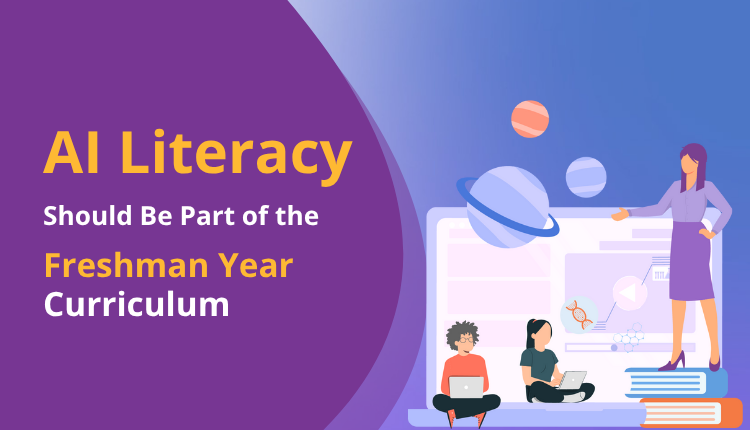Picture two universities, identical in rankings and resources. University A invests heavily in AI detection software, training faculty as digital detectives and fostering an atmosphere of suspicion. University B embeds AI literacy from day one, empowering students as ethical AI collaborators and leveraging transparent tools to enhance learning.
Fast forward three years. Which university’s graduates are leading innovation? Which institution attracts top talent? One need not conduct a thought-experiment to arrive at the answer. It lies in stark workforce realities.
The World Economic Forum warns that AI skills now trump job experience. Two-thirds of business leaders won’t hire candidates without AI competencies, and nearly three-quarters prefer less experienced candidates with AI skills over seasoned ones without them. This profound shift means that students graduating without foundational AI competencies are entering a workforce that increasingly demands them.
AI Literacy is the Need of the Hour
But what exactly is AI literacy? Far beyond technical proficiency, it represents a comprehensive set of competencies that enables individuals to critically evaluate AI technologies, communicate and collaborate effectively with AI and use AI as a tool online, at home, and in the workplace. At its core, AI literacy emphasizes understanding how AI systems work, their effective use, how to evaluate their output, and recognizing their weaknesses and dangers.
Recent research reports that AI literacy improves student involvement in learning, their critical thinking abilities, prepares them for AI-integrated careers and also improves their ethical reasoning regarding technology’s impact in this constantly changing landscape. While we are at it, it is also crucial to understand the distinction between AI literacy and mere AI usage. A recent study with around 666 participants revealed a troubling reality where frequent AI tool usage without guided literacy actually erodes critical thinking. The message is clear—structured AI literacy, not unregulated AI access, is what develops competent professionals.
The Flawed “Detection-First” Mindset and Its Hidden Costs
Despite the growing need for AI literacy integration at the ground level, most institutions remain stuck in a detection-first mindset—treating AI as a threat rather than a transformative tool. This approach comes with substantial hidden costs that ripple through every level of academic institutions.
AI-generated text detection tools suffer from serious limitations that make them unsuitable for high-stakes academic decisions. Carefully conducted research show they are neither accurate nor reliable due to the inconsistent results riddled with false-positives and false-negatives. The performance of such tools further goes down when texts are manually edited or machine-paraphrased—common techniques that render detection almost impossible.
The stark reality is that detection tools for AI-generated text should not be used as the sole basis for reporting students for academic misconduct, yet many institutions continue this problematic practice, primarily due to lack of better alternatives.
Outcome-Focused Revolution
The most successful institutions are shifting from input-focused to outcome-focused learning. Instead of asking, “How was this work created?” they ask, “What did the student learn, and how can we help them learn more?”
Stakeholders should now harness the true potential of AI in personalizing learning at scale—identifying gaps, predicting outcomes, and recommending tailored learning paths. This transforms educators from compliance officers into learning architects.
Transparency is the Way Forward
As it is well-established now, the future is neither AI prohibition nor unregulated use. It’s transparency—clear documentation of how AI tools contribute to the learning process.
Imagine students demonstrating their learning journey in real-time, showing how they engaged with AI, what they learned, and how they applied critical thinking to AI outputs. This approach builds trust and maintains academic integrity. Trinka’s DocuMark offers exactly that!
DocuMark: Making Transparent Learning a Reality
Trinka’s DocuMark empowers institutions to embrace AI literacy with transparency, accountability, and trust. It enables:
- Real-time AI usage documentation
Students’ work is automatically recorded on how, when, and where they used AI tools in their assignments, fostering responsible use of AI. - Clear attribution of AI contributions
DocuMark distinguishes between student-written and AI-assisted text, showing faculty exactly what was generated, edited, or refined using AI. - Evidence of critical thinking
Students can add reflections explaining why they used AI, how they evaluated its output, and how it informed their learning and final submission. - Streamlined academic integrity workflows
Faculty receive comprehensive AI usage reports, reducing the burden of manual detection, investigation, and justification for every suspected case. - Equity and fairness in assessments
Transparent documentation ensures students are evaluated on learning outcomes rather than penalised based on unreliable AI detection suspicions. - Compliance with institutional policies
DocuMark aligns with evolving AI use guidelines, helping institutions establish clear, enforceable standards without creating a culture of fear.
In a world where AI literacy defines future-ready graduates, DocuMark bridges the gap between responsible AI use and academic integrity, positioning institutions as leaders in ethical, innovative education.
Act Now to Shape the Future!
Universities integrating AI literacy from freshman year are not just preparing students for the future—they’re creating it. These institutions:
- Attract top-tier students seeking forward-thinking education
- Recruit innovative faculty who prefers teaching over policing
- Partner with leading organizations that value AI-literate graduates
- Lead research in AI-human collaboration
- Shape policy and practice
Ready to transform your institution from a culture of detection to one of development? Discover how DocuMark can help you build transparent, outcome-focused learning that prepares students for an AI-driven future.
Book your free demo today and join the educational leaders already reshaping tomorrow.

